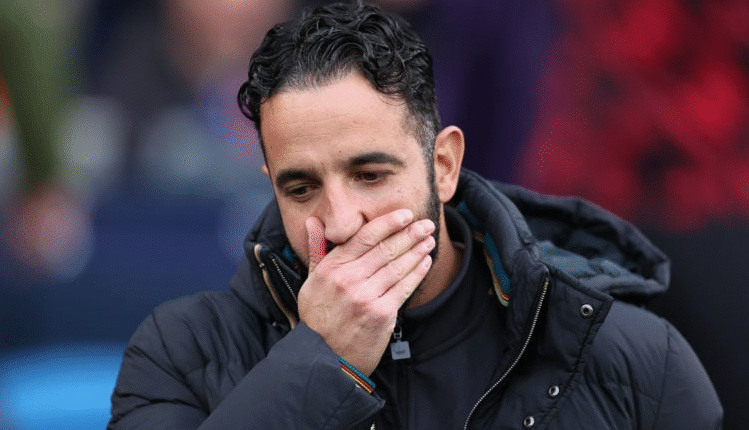Ruben Amorim: Why Manchester United’s Problem is Not the System, It’s the Personnel
Ruben Amorim: Why Manchester United’s Problem is Not the System, It’s the Personnel. Every time Manchester United go through a rough patch, one question dominates fan debates: Is it the manager or the players?
Right now, the latest name trending on X (Twitter) and fan forums is Rúben Amorim, Sporting CP’s bright, young tactician. At 39, he is one of Europe’s most sought-after coaches — praised for his dynamic 3-4-3 system and ability to develop players. Many United fans see him as the next great hope after mixed results under Erik ten Hag.
But here’s the uncomfortable truth: Manchester United’s problem isn’t the tactics. It isn’t even entirely about who stands in the dugout. The biggest obstacle to consistent success is the personnel — the players who are supposed to execute the system.
Before we talk about whether Amorim would be the right fit, we need to examine what makes his approach special — and why United may not have the right pieces to make it work.
Understanding Ruben Amorim’s System
Rúben Amorim’s tactical identity is rooted in his 3-4-3 / 3-4-2-1 formation, built around three core principles:
Back Three with Ball-Playing Defenders – Sporting’s centre-backs are comfortable on the ball, stepping into midfield to help progress play.
Flying Wing-Backs – They stretch the pitch, provide width, and often arrive late in the box for cutbacks.
High Press & Quick Vertical Play – Amorim’s teams press aggressively, win the ball high, and transition into attack quickly.
This system has transformed Sporting CP. He ended their 19-year title drought, built a core of young players (Pedro Gonçalves, Nuno Mendes before his PSG move), and made them competitive in Europe — all with a relatively modest budget.
For United fans, Amorim represents the dream of attacking football, identity, and long-term project building — something they’ve craved since Sir Alex Ferguson retired.
The Manchester United Context
Under Erik ten Hag, United already play a modern system. It’s usually a 4-2-3-1, with pressing triggers, full-backs tucking in, and quick transitions. When it works — like in big wins over Liverpool or Barcelona last season — it looks electric.
But more often than not, it’s inconsistent. The problems are less about formation diagrams and more about:
Defensive Instability:
Lisandro Martínez has been injured frequently, leaving United without their best ball-playing CB. Harry Maguire and Jonny Evans lack pace for a high line.Midfield Imbalance:
Casemiro is struggling to cover ground like he did last year. Sofyan Amrabat has been used out of position. Scott McTominay is a goal threat but not a progressive passer.Attacking Wastefulness:
Rasmus Højlund has potential but needs service and confidence. Marcus Rashford drifts in and out of games. Antony has yet to justify his fee.
The result? United create chances but fail to finish them, defend well for 70 minutes but concede soft goals, and struggle to control midfield against elite sides.
System vs. Personnel
This is where the key argument comes in: no system works without the right players.
Take the recent defeat against Brighton as an example. United started brightly, pressed well, and created three big chances in the opening 25 minutes. They failed to convert any of them. Brighton scored with their first meaningful attack — a goal that came after United lost the ball cheaply in midfield.
That’s not a system failure. That’s a combination of poor finishing and individual errors.
Personnel Problems That System Changes Won’t Fix
Right-Back Instability
Diogo Dalot is good going forward but can be exposed defensively. Aaron Wan-Bissaka is a defensive wall but struggles in build-up. Neither perfectly fits the profile of a modern wing-back.Lack of a Press-Resistant #6
Amorim’s system needs a midfielder who can receive under pressure and dictate play. Casemiro is great defensively but not press-resistant enough. United lack a Rodri, Rice, or even João Palhinha type.No Natural Left Centre-Back Depth
When Martínez is injured, United lose their best distributor from the back. Playing a back three without him would be risky.Inconsistent Forward Line
Amorim’s Sporting thrives on quick combinations between front three players. United’s forwards are too often isolated or inefficient.
How Amorim Would Line Up United
Let’s imagine Amorim in charge at Old Trafford tomorrow. His predicted 3-4-3 might look like this (assuming current squad):
GK: Onana
CBs: Varane – Martínez – Shaw
Wing-Backs: Dalot – Malacia
CMs: Casemiro – Eriksen
Front 3: Rashford – Bruno – Højlund
Key Problems with This XI
Fitness: Martínez and Shaw are injury-prone.
Midfield Legs: Eriksen + Casemiro would be overrun against athletic teams.
Wing-Back Profiles: Dalot and Malacia are decent but not elite wing-backs who can maintain width and end product for 90 minutes.
This highlights the recruitment issue. To make Amorim’s system shine, United would still need 2–3 major signings: a ball-playing centre-back, an elite defensive midfielder, and a right-sided forward comfortable in a front three.
Tactical & Data Comparison
| Aspect | Sporting under Amorim | Man Utd under Ten Hag |
|---|---|---|
| Formation | 3-4-3 / 3-4-2-1 | 4-2-3-1 |
| Build-up Play | Wide overloads, patient | Direct, vertical, transition-based |
| Defensive Line | High, aggressive press | Mid-block, mixed press |
| Key Strength | Compactness, fluidity | Fast breaks, chaos moments |
| Weakness | Vulnerable to counters | Individual errors, finishing |
Notice how Ten Hag’s United already uses similar pressing triggers and positional play ideas — they just don’t have the consistency or personnel to sustain it.
The Real Solution
If Manchester United want to truly compete, they must:
Recruit Intelligently
Sign players that fit the tactical vision — not just big names.Ball-playing CB (Kim Min-jae, Pau Torres-type)
Press-resistant #6 (Neves, Ugarte-type)
Dynamic winger/wing-back hybrid
Build Long-Term Cohesion
Constantly switching managers resets progress. United must commit to a coach’s vision and back him with time and the right squad.Fix the Culture
United need more accountability on and off the pitch — players who maintain intensity whether it’s the first game of the season or the last.
Closing Argument
Rúben Amorim is a fantastic coach. He could absolutely bring identity and energy back to Manchester United.
But unless the club addresses squad building, any manager — Amorim, Ten Hag, or anyone else — will face the same struggles.
The conclusion is simple: Manchester United’s problem isn’t the system — it’s the personnel.
Until that changes, fans may keep seeing the same frustrating cycle, no matter who is on the touchline.
Final Thought
If United’s hierarchy truly want a reset, they must pair the right manager with the right recruitment strategy. Get that right, and Old Trafford might finally see the kind of football that once made it the Theatre of Dreams.

